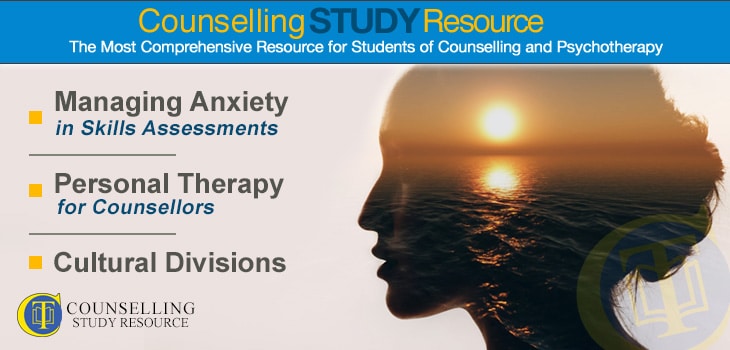097 – Personal Therapy for Counsellors
Managing Anxiety in Skills Assessments – Cultural Divisions
In episode 97 of the Counselling Tutor Podcast, Ken Kelly and Rory Lees-Oakes talk about the natural anxiety that students often experience when having their counselling skills observed and/or assessed. In ‘Practice Matters’, Rory explores the thinking behind the requirement of many counselling courses for personal therapy for counsellors. Finally, the presenters explore culture, and how cultural differences can affect the therapeutic relationship.
Managing Anxiety in Skills Assessments (starts at 3.14 mins)
Skills observation and assessment are a standard part of many counselling courses, with different requirements at different levels.
For example, at level 2, students are beginning to develop basic skills of listening and attending; at level 3, they may have to produce a recording of a short session; and at level 4 (practitioner-level training), they will be assessed for advanced counselling skills, in order to see when they are ‘fit to practise’.
It is natural to feel anxious when being observed: it can feel invasive to have a third person (whether an actual one or a recording device) in the room, and can raise questions within our own heads of whether we are good enough.
Ken and Rory offer various tips on how to assuage anxiety in skills observations:
- Remember the reasons for being observed: it is a step towards becoming a qualified counsellor, it helps you develop, and it helps ensure that clients are safe (in that they are not exposed to counsellors who are not yet fit to practise).
- The tutor is assessing your skills, not judging you as a person.
- Record your skills sessions even when not being assessed – this will help you get used to having a recording device in the room, and so feel less anxious about this.
- Try to see skills observation as an opportunity to get valuable feedback.
- If you struggle to listen back to your recordings because you dislike the sound of your own voice, explore this in personal development.
- Ask your client to be real – role-play generally doesn’t work in counselling skills practice. If the person doesn’t have any big issues to bring, they can always draw on an everyday event and how they feel about this.
- As the counsellor, be real too in verbally acknowledging the presence of a third person in the room in your contracting.
- Let go of any expectations about where the session might go: just let it progress naturally.
Above all, take some deep breaths and go for it! And stick at it: learn from the experience and apply this learning to your next skills practice. You will get there! After all, we are all still learning all the time.
Personal Therapy for Counsellors (starts at 16.14 mins)
Many counselling training courses require students to access a certain number of hours of their own personal therapy.
In this segment of the podcast, Rory explores the reasons for requiring personal therapy for counselling students.
He also examines the tricky question of whether it is right to oblige trainee counsellors to go to therapy when the general principle in counselling is that it must be entered into voluntarily.
Rory describes the many benefits of personal therapy for counsellors, of experiencing therapy as a client, and the potential dangers (to both you and your future clients) of not doing so.
We have a handout available on this important topic here – or you can access it via the Handouts Vault and Counselling Study Resource (CSR).
Cultural Divisions (starts at 20.21 mins)
What happens when you’re working in an area that has a distinctive culture?
This question was asked recently in our Facebook group, which includes over 21,000 people (students, tutors and qualified counsellors) interested in the world of counselling and psychotherapy.
Equality and diversity are topics that receive much attention in counselling training, but culture can be harder to detect – and so cultural differences between people can slip in unseen.
Ken and Rory share a number of anecdotes based on their own experiences that show how cultural difference can impact on the therapeutic relationship.
Have you had experiences as a counselling client where cultural differences have affected the counselling relationship? How might your culture contaminate the relationship with clients from different cultures? Do let us know via the Facebook group.
Free Handout Download
Compulsory Therapy in Counselling Training: An Oxymoron?
